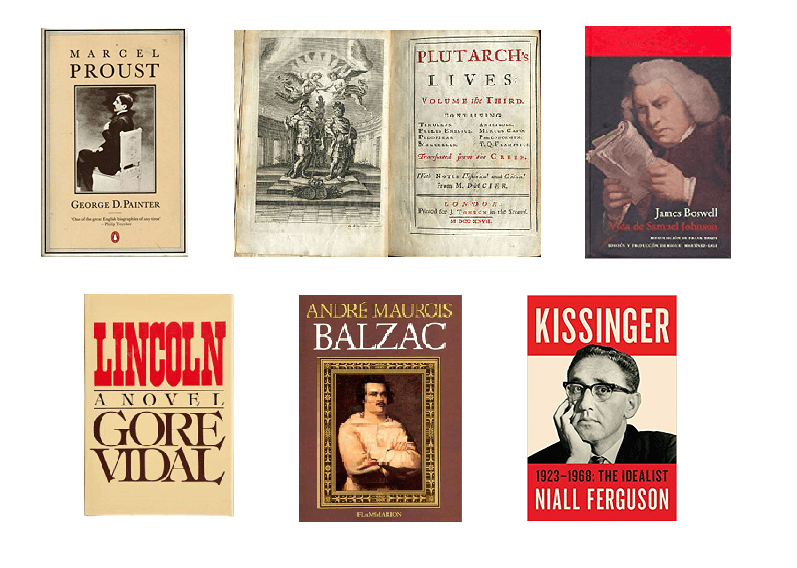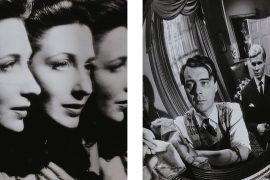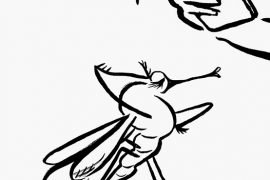[dropcap letter=”E”]
In the old times biographies were read to discover the greatness of the protagonists of the past, becoming a stimulus. The reader sought models of exemplarity -whether public virtue or heroic impetus- and at the same time scrutinized in the weaknesses of great men the risk of his own mistakes. In Parallel lives, successive generations of readers learned the lessons that Plutarch offered in his comparative narrative of the lives of the main characters of Greece and Rome. Even the protagonists of the French Revolution continued to be inspired by the vital and moral models described by Plutarch. In our low-cost era, returning to the plutarchian pages can still explain who we are.
After Freud, in the permissive society of postmodernity, why do we read biographies? It would be too much to say that we have gone from appreciating human greatness to understanding it as the simulation of an inescapable contradiction that relativizes the classical virtues and sees them as psychic fractures, because the truth is that we still read biographies to learn something in the lives of others and because a good biography can be read as a novel, for its narrative capacity while, due to its impeccable inquiry it also teaches history. In biographies there can be no fiction, but the same lively passion with which Tolstoy portrays Anna Karenina. Leaving aside the biographers specialized in throwing garbage on their biographies’ protagonists, writers and historians continue striving to investigate the ambiguities that are at the same time examples of greatness and human servitude.
That was already Plutarch’s effort. With his sexual promiscuity and his vanity, Marcus Antonius becomes, according to Plutarch, a hostage of his lust, someone who “committed greater violence according to the great power he had”. From there, even literally, Shakespeare draws his Antony and Cleopatra. It could have been a novel, but it was theatre: above all, poetic energy. Unfortunately, the character is no longer listed on any stock exchange, or in life itself, by the concurrence of narcissism ranging from the negation of the father, the shipwreck of the epic and a solipsistic conception of freedom to its category of honour. Although decreasingly, we continue to read biographies, to learn something about the life of an inventor, a king, an explorer, an artist or a classy ruffian, because we feel human curiosity about existential complexity. Thus, we furtively caress the memory of the battles that nobody has told us. Every generation that recognises itself as belonging in the waves of history yearns for a deed unfulfilled.
In other times, one would start with Plutarch, read in the moth-eaten edition of some ancestor reader, or had closer Marañón’s Tiberius -for example-, but the most frequented biographies were those of Stefan Zweig, André Maurois or Emil Ludwig, already after the delicious summaries published by the Araluce Collection for children. Now we are between the video game and series like Game of Thrones. It’s that or the deconstruction of the character. One cannot assume that monographs or doctoral theses may have the art of biography, since they rather they tend to be tiresome accumulations of data without selective order. Between the deconstruction and the doctoral, heavy brochure, the search for that Rosebud is impracticable, which -as in Citizen Kane– aims to encrypt a whole life. Actually, more than the formula of a “Rosebud” as a destiny, the great characters are usually a maze that goes from chance to will. The writer of lives -says the fine biographer Leon Edel- is allowed imagination in the form of telling and presenting but not in terms of the facts. That is the boundary between the biography and the novel, underlined by the evidence that the novelist can be omniscient -and bold, to the point of modelling real characters, as did Gore Vidal with Lincoln- but not the biographers. Its limit lies in those cardboard boxes full of old photos, notes on a paper napkin or letters of lovers that the art of biography has to move from chaos to an interpretative order in which a minimum detail can represent the passions of a time.
It is often considered that ‘The Life of Samuel Johnson’ by James Boswell is the best biography ever told and it is true that Doctor Johnson is an unlimited character and that his biographer had the great advantage of treating him and listening to him
Men rush towards complexity but -Chesterton said- they sigh for simplicity: “They try to be kings, but they dream of being pastors.” Today, the fortunate return of Chesterton means for the reader a victory in the shadow of the sword in the harsh Eden of the Middle Ages and in the light of the lamppost of the old English inn. Soon will also return his biographies -Chaucer, Stevenson, Shaw, Browning or Dickens-, masterful works, to detect the golden thread that exists in every creative personality. Among biographers, the fundamental error is modernity, “which means the search for truth as a function of time”.
The problem of being a trustworthy interlocutor is that, from the fact of constricting so much the ego one can end up looking like a meek echo and somehow unintelligent. Perhaps that is what happens with James Boswell when he tells about Dr. Johnson’s life or when Eckermann records his conversations with Goethe. When talking with De Gaulle, Malraux is the opposite, so the greatness of the page may not correspond with what the general said. Who knows to what extent what Malraux says that Mao told him is shameless fiction.
 It is often considered that The Life of Samuel Johnson by James Boswell is the best biography ever told and it is true that Doctor Johnson is an unlimited character and that his biographer had the great advantage of treating and listening to him, to the extent that a good part of the book is the literal reflection of their conversations. Not pretending to establish any comparison, something similar happens to Josep Pla with his portrait of Manolo Hugué. But neither Boswell nor Pla’s book is the archetype of the biographical genre, which in general requires analysis of exhaustive documentation, letters, private papers, testimonies of secondary characters and the background of an entire era. Except the barefaced biographers, the ideal is to approach the truth of the character as much as possible, and although the desire to offer moral lessons no longer prevails, it is still present the desire to know ourselves through the reading of the books of those who triumphed or failed in their lifetime.
It is often considered that The Life of Samuel Johnson by James Boswell is the best biography ever told and it is true that Doctor Johnson is an unlimited character and that his biographer had the great advantage of treating and listening to him, to the extent that a good part of the book is the literal reflection of their conversations. Not pretending to establish any comparison, something similar happens to Josep Pla with his portrait of Manolo Hugué. But neither Boswell nor Pla’s book is the archetype of the biographical genre, which in general requires analysis of exhaustive documentation, letters, private papers, testimonies of secondary characters and the background of an entire era. Except the barefaced biographers, the ideal is to approach the truth of the character as much as possible, and although the desire to offer moral lessons no longer prevails, it is still present the desire to know ourselves through the reading of the books of those who triumphed or failed in their lifetime.
For biographers, the authorization of the family or literary executor of the biographed has often been a requirement that obliged hagiographic services, so that the authors, at the risk of not having access to the family file, have to subtitle their book as a non-authorized biography. Consequently, Freud burned his diaries and notes to make difficult the work of his future biographers. More positive is the symbiosis between biographed and biographer, as it happens in our days with the splendid biography of Kissinger that is being written by the historian Niall Ferguson -published in its first volume-. The problem lies in the biographer’s self-control so as not to identify too much with his biography, or to hate him to the point of losing himself in the shadows for having denied the light.
Chesterton says that it is convenient that there is a secret continent in the character of the man about from whom it is written. Two very important things are preserved thus: “the modesty in the biographer and the mystery in the biography”. According to Chesterton, the sin of biographers and the error in which they fall is to want to find meaning in everything. In other words: “Certainly the poetry of the poet’s life is very different from his biography: it is not born from what he did, but from what he thought while doing nothing; He does not leave what he manifested when he worked or fell in love, but what his soul allows him to manifest while he writes. The poet does not sit down to write in verse the diary of his life. That is not the way to make poetry. On the other hand, it seems that this is the way to make biographies”. Something like this can be verified when reading the voluminous biography of Proust written by George Painter: we come to think that the abundance of details hinders both the quality of the anecdote and of the category. Contrast with the finesse with which Ghislain de Diesbach investigates the secrets of Proust.
Like so many other times, entering the biographies of André Maurois, even if it may seem uncomfortable in the cases of ménage à trois, explains more vital insights than the habit of converting biographical art into a Freudian couch. Once upon a time there was some book by André Maurois in most homes, lying on a shelf among copies of illustrated magazines. He still sets an example for a measured writing that seeks to clarify the possible truth, decidedly in favour of prudence and without the ravages of originality. With Maurois as biographer, Disraeli, Balzac, Victor Hugo, Chateaubriand or Napoléon were in the best hands.
In the already exhausted community of readers there are those who, advanced in maturity, prefer to read fewer novels and opt for history books, biographies or memories. This fact, well-known, turns into an element of provocation in the words of the novelist Philip Roth; who said, a few years before dying, that he no longer read fiction, giving as a reason that he had awakened. It makes sense: the older, the less fiction. What novel character can compete with a biography of Hitler or Michelangelo? Thousands of political trainees discovered in Zweig’s Fouché the hidden side of power. By contrast, in André Maurois’s Three Dumas, life is animated with generosity and adventure.
A good biography tells us the course of a life and at the same time is a block of pages that, being faithful to the facts, belongs to the best of literature, such as the work of historians like Tacitus, Toreno or Macaulay. Currently, the problem is usually the boring stoutness of those who have confused the art of biography with a collection of data without basting, forgetting both the power to narrate and the desire to interpret for readers the life of someone who has meant quite a lot, for better or worse.
We continue reading biographies. They inform us, provide vital stimuli, help to understand some complexities of History and the human mind. By programming a reader’s life, the librarian Phillip Ward -500 books for 50 years- includes Plutarch, in addition to the portraits written by Tacitus or Suetonius, the lives of artists of Giorgio Vasari and even the exotic Alexiada in which Anna Comnena tells the life of his father, the emperor of Byzantium Alexis (1081-1153). Although she sanctifies the emperor father, Anna Comnena describes the hidden worlds of the Byzantine court. Something similar was done with The Court of Louis XIV by Voltaire. Carlyle was right when he said that History is the essence of innumerable biographies.




















